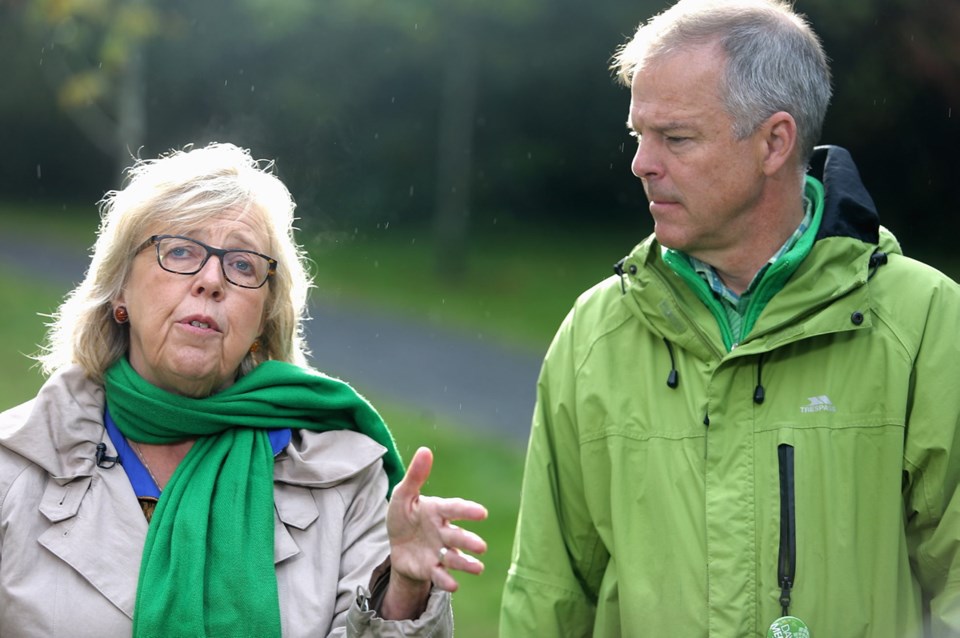It was already standing room only in St. Paul’s United by the time Elizabeth May arrived, just in time for the all-candidates’ debate on the environment to begin.
“I’m here, hello,” she said, earning warm applause. What else would you expect? Inviting May to debate climate change in a church in Sidney is like asking Don Cherry to talk about Dougie Gilmour in a Toronto hockey bar. This is the heart of Saanich-Gulf Islands — let’s call it Greened Zero — where she last won election with more votes than the rest of the candidates combined.
People forget that Saanich-Gulf Islands was a green — that’s small-G green — enclave long before May got there. In fact, she moved to Sidney from back East a decade ago largely because her party thought the riding, with its mix of Salt Spring treehuggers and Gore-Texed Peninsula retirees, was the party’s best chance for a breakthrough.
Prior to May’s arrival, the 2008 election saw Liberal candidate Briony Penn, who would be in the Environmentalists Hall of Fame if such a thing existed, run a strong second to incumbent Conservative cabinet minister Gary Lunn.
The question now is whether the party can ride a tide of climate concern to finally break out of the bridgehead May first won in 2011. Paul Manly’s byelection win in Nanaimo-Ladysmith this spring — the only time someone other than May has been elected to Parliament as a Green — has buoyed their hopes.
At the Sidney debate, May dreamed out loud of electing enough MPs to play powerbroker in a tight minority government, forcing the ruling party to put urgent climate action atop its agenda “to ensure we don’t continue to kick it down the road to our children.”
The hurdle she faces is that up until now the Greens have been like lacrosse, a niche sport that is taken seriously in a couple of regions — mostly ours — but consigned to the fringe almost everywhere else in Canada.
If May is to get more pals in Parliament, they’ll have to come from Vancouver Island, where five of the seven seats are now held by the NDP.
The Greens, whose very name is an enviro-brand, and who have a poster child in May, who has been burrowing into climate science since 1986, like their chances.
Not that the New Democrats are yielding ground. They might oppose the Liberals and Conservatives but seem to really resent the Greens, whom they see as poaching their votes, and whose candidates they often portray as lightweights — if not crackpots — benefiting from the Green brand at an opportune time.
New Democrats bridle with injustice at the prospect of losing an MP like Courtenay-Alberni’s Gord Johns, the driving force behind the nationwide ban on single-use plastics that Justin Trudeau has promised.
In fact, none of the parties are ceding the enviro-vote. Far from it. All Vancouver Island candidates are surfing that green wave this year. In part, that’s because they’ll drown at the ballot box if they don’t. In part, it’s because they really care.
Note that when Conservative candidate Dr. Randall Pewarchuk opened his campaign headquarters in Esquimalt-Saanich-Sooke last month, the first thing he talked about was the need to address climate change. True, he stuck to the party’s anti-carbon-tax line, but it was still significant that he chose to lead with the topic. Remember, this was while addressing an in-house audience of true-blue Conservatives, not a public forum on the environment.
That very same day, when Sabina Singh, the New Democrat running against May in Saanich-Gulf Islands, opened her campaign office, she spoke of being motivated by the need to address climate change for the sake of her children.
Likewise, the riding’s Liberal candidate, Ryan Windsor, pushed an environmental platform when successfully running for mayor of Central Saanich, and once ran as a B.C. Green on the Lower Mainland. Other Liberals also flash strong eco-credentials. Nikki Macdonald, who is running in Victoria, earned a doctorate that focused on ocean governance, held a post with Ocean Networks Canada and helped bring ocean-research money to UVic.
Where the parties differ is how far and how quickly they want to go in addressing climate change. That ranges from a Conservative plan that they say protects the economy but that critics say does little to force real action, to a Green party plan that would drastically cut emissions but that critics say doesn’t include a realistic path to implementation.
Then there’s the fledgling People’s Party, which believes global warming is a natural phenomenon to which humans can adapt, but are helpless to change.



